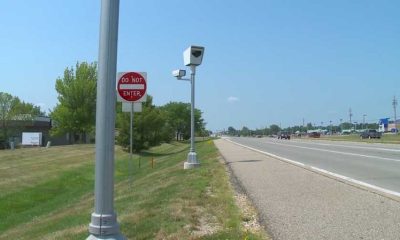U. S. News
777s with engine that blew apart should be grounded, Boeing says

Boeing has recommended that airlines ground all 777s with the type of engine that blew apart after takeoff from Denver this past weekend, and most carriers that fly those planes said they would temporarily pull them from service.
The U.S. Federal Aviation Administration ordered United Airlines to step up inspections of the aircraft after one of its flights made an emergency landing at Denver International Airport on Saturday as pieces of the engine’s casing rained on suburban neighborhoods. None of the 231 passengers or 10 crew were hurt, and the flight landed safely, authorities said. United is among the carriers that has grounded the planes.
Boeing said there were 69 777s with the Pratt & Whitney 4000-112 engines in service and another 59 in storage and affirmed they should be grounded until the FAA sets up an inspection regime.
Two Japanese airlines have another 32. Japan ordered the planes out of service, according to the financial newspaper Nikkei, while noting that an engine in the same family had trouble in December.
In South Korea, Asiana Airlines grounded nine, seven of which were in service, and Korean Air said it grounded 16 aircraft, six of which are in service.
“We are working with these regulators as they take actions while these planes are on the ground and further inspections are conducted by Pratt & Whitney,” Boeing said in a statement, referring to American and Japanese regulators.
The engine maker said it was sending a team to work with investigators.
Video posted on Twitter from Saturday’s emergency showed the engine fully engulfed in flames as the plane flew. Freeze frames from different video taken by a passenger sitting slightly in front of the engine and also posted on Twitter appeared to show a broken fan blade in the engine.
Passengers, who were headed to Honolulu, said they feared the plane would crash after an explosion and flash of light, while people on the ground saw huge chunks of the aircraft pour down, just missing one home and crushing a truck. The explosion, visible from the ground, left a trail of black smoke in the sky.
The U.S. National Transportation Safety Board said that two of the engine’s fan blades were fractured and the remainder of the fan blades “exhibited damage.” But it cautioned that it was too early to draw conclusions about what happened.
The NTSB said the cockpit voice recorder and flight data recorder were transported to its lab in Washington so the data can be analyzed. NTSB investigations can take up to a year or longer, although in major cases the agency generally releases some investigative material midway through the process.
Japan’s Ministry of Land, Infrastructure, Transport and Tourism said an engine in the PW4000 family suffered trouble on a Japan Airlines 777 flying to Tokyo from Naha on Dec. 4. The airline has said the plane had engine trouble after takeoff and returned to Naha. An inspection showed damage to the engine case and missing fan blades, according to the airline. Stricter inspections were ordered in response.
-

 Local News2 weeks ago
Local News2 weeks agoHy-Vee gives the Northeast Iowa Food Bank a donation of over $139,000
-

 Iowa2 weeks ago
Iowa2 weeks agoThe governor of Iowa signs a bill granting the state the power to detain and expel some immigrants
-

 Local News2 weeks ago
Local News2 weeks agoOne-armed Central DeWitt archer getting ready for the nationals
-

 Local News2 weeks ago
Local News2 weeks agoThe annual Special Olympics competition in Iowa creates a sense of community
-

 Iowa1 week ago
Iowa1 week agoLegislators in Iowa enact a bill to improve disability accessibility in state parks
-

 Local News5 days ago
Local News5 days agoThe Mississippi River Bridge in Lansing reopens on Saturday
-

 Local News1 week ago
Local News1 week agoNonprofit plans to launch a sober living facility for veterans in Cedar Rapids
-

 Local News1 week ago
Local News1 week agoLegislation restricting traffic cameras is headed to the governor’s desk






Leave a Reply